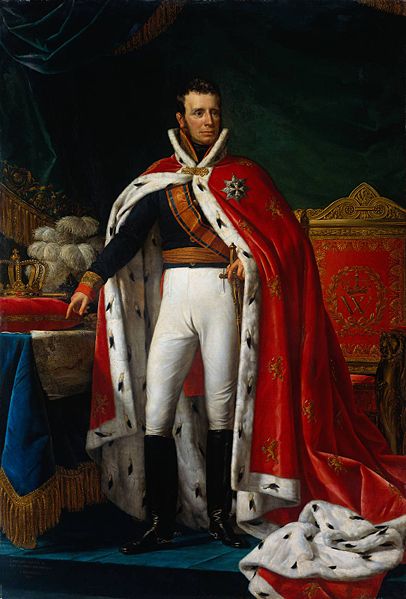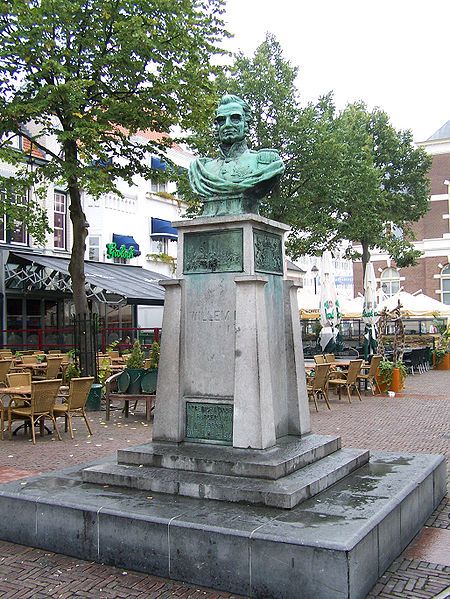<Back to Index>
- Explorer James Weddell, 1787
- Writer Jorge Luis Borges, 1899
- King of the Netherlands William I Frederick, 1772


William I Frederick, born Willem Frederik Prins van Oranje-Nassau (The Hague, 24 August 1772 - Berlin, 12 December 1843), was a Prince of Orange and the first King of the Netherlands and Grand Duke of Luxembourg.
In Germany, he was ruler (as Fürst) of the Principality of Nassau-Orange-Fulda from 1803 until 1806 and of the Principality of Orange-Nassau in the year 1806 and from 1813 till 1815. In 1813 he was named 'Sovereign Prince' of the Netherlands, and proclaimed himself King of the Netherlands and Duke of Luxembourg on 16 March 1815. In the same year on 9 June William I became also the Grand Duke of Luxembourg and after 1839 he was furthermore the Duke of Limburg. After his abdication in 1840 he named himself King William Frederick, Count of Nassau.
King William I's parents were the last stadtholder William V, Prince of Orange, and his wife Wilhelmina of Prussia. Until 1813, William was known as William VI, Prince of Nassau-Dietz, Prince of Orange. In Berlin on 1 October 1791, William married his first cousin (Frederica Louisa) Wilhelmina, born in Potsdam. She was the daughter of King Frederick William II of Prussia. After Wilhelmina died in 1837, William married Countess Henriette d'Oultremont de Wégimont (Maastricht, 28 February 1792 - Schloss Rahe, 26 October 1864), created Countess of Nassau, on 17 February 1841 in Berlin. This was a morganatic marriage. Two years later, William died. William V was hereditary stadtholder when the Republic of the Seven United Provinces was invaded by the French Revolutionary armies in 1794. In January 1795 he fled with his son to England.
Unlike his father, who gave his people permission to collaborate with
the French, William was a strong personality and he tried to regain the
Republic. In 1799, William landed in the current North Holland as part of an Anglo-Russian invasion.
The local Dutch population was not pleased with the arrival of the
prince. Some local Orangists were even executed. After several minor
battles he was forced to leave the country again after the Convention of Alkmaar. Napoleon Bonaparte
gave him some small German principalities as indemnities for the lost
territories. These principalities were confiscated when Napoleon invaded Germany (1806)
and William supported his Prussian relatives. He succeeded his father
as prince of Orange later that year, after William V's death. After
Napoleon's defeat at Leipzig (October, 1813), the French troops
retreated to France. A provisional government was formed under the lead
of some former Patriots who
recalled William, in contrast to their 1785 rebellion. In their view,
it was taken for granted that William would have to head any new
regime, and it would be better in the long term for the Dutch to
restore him themselves. The Dutch population was pleased with the
departure of the French, who had ruined the Dutch economy, and this
time welcomed the prince. On 30 November 1813 William landed at Scheveningen beach,
only a few metres from the place where he had left the country with his
father eighteen years previously, and on 6 December the provisional
government offered him the title of King.
William refused, instead proclaiming himself "sovereign prince". He
also wanted the rights of the people to be guaranteed by "a wise
constitution". The
constitution offered William extensive (almost absolute) powers.
Ministers were only responsible to him, while a two-chambered
parliament (the States-General) exercised only limited power. He was inaugurated as sovereign prince in the New Church in Amsterdam. In 1814 he gained sovereignty over the whole of the Low Countries. Feeling threatened by Napoleon who had escaped from Elba, William proclaimed himself King of the United Kingdom of the Netherlands on 16 March 1815 at the urging of the powers gathered at the Congress of Vienna. His son, the future king William II, fought as a commander at the Battle of Waterloo.
After Napoleon had been sent into exile, William adopted a new
constitution which included much of the old constitution, such as
extensive royal powers. He was the 876th Knight of the Order of the Golden Fleece in Spain and the 648th Knight of the Order of the Garter in 1814. The States-General was divided into two chambers. The Eerste Kamer (First Chamber or Senate or House of Lords) was appointed by the King. The Tweede Kamer (Second
Chamber or House of Representatives or House of Commons) was elected by
the Provincial States, which were in turn chosen by census suffrage.
The 110 seats were divided equally between the North and the South
(modern-day Belgium), although the population of the North (2 million)
was significantly less than that of the South (3.5 million). The
States-General's primary function was to approve the King's laws and
decrees. The constitution contained many present-day Dutch political
institutions; however, their functions and composition have changed
greatly over the years. The
constitution was accepted in the North, but not in the South. The
under-representation of the South was one of the causes of the Belgian
Revolution. Referendum turnout was low, in the Southern provinces, but
William interpreted all abstentions to be yes votes. He prepared a lavish inauguration for himself in Brussels, where he gave the people copper coins (leading to his first nickname, the Copper King). The spearhead of King William's policies was economic progress. As he founded many trade institutions, his second nickname was the King-Merchant. In 1822, he founded the Algemeene Nederlandsche Maatschappij ter Begunstiging van de Volksvlijt,
which would become one of the most important institutions of Belgium
after its independence. Industry flourished, especially in the South.
In 1817, he also founded three universities in the Southern provinces,
such as a new University of Leuven, the University of Ghent and the University of Liège. The Northern provinces, meanwhile, were the centre of trade. This, in combination with the colonies (Dutch East Indies, Surinam and the Netherlands Antilles)
created great wealth for the Kingdom. However, the money flowed into
the hands of Dutch directors. Only a few Belgians managed to profit
from the economic growth. Feelings of economic inequity were another
cause of the Belgian uprising. Officially, a separation of church and state existed in the kingdom. However, William himself was a strong supporter of the Reformed Church. This led to resentment among the people in the South, who were Roman Catholic. William had also devised controversial language and school policies. Dutch was imposed as the official language in (the Dutch-speaking region of) Flanders; this angered French-speaking
aristocrats and industrial workers. Schools throughout the Kingdom were
required to instruct students in the Reformed faith and the Dutch
language. Many in the South feared that the King sought to exterminate
Catholicism and the French language. In August 1830 the opera La Muette de Portici, involving the repression of Neapolitans,
was staged in Brussels. Performances of this show seemed to crystallise
a sense of nationalism and "Hollandophobia" in Brussels, and spread to
the rest of the South. Rioting ensued, chiefly aimed at the kingdom's
unpopular justice minister, who lived in Brussels. An infuriated
William responded by sending troops to repress the riots. However, the
riots had spread to other Southern cities. The riots quickly became
popular uprisings. Soon an independent state of Belgium was proclaimed. The
next year, William sent his sons to Belgium to repress this state.
Although initially victorious, the Dutch army was forced to retreat
after the threat of French intervention. Some support for the Orange dynasty (chiefly among Flemings) persisted for years but the Dutch never regained control over Belgium.
William nevertheless continued the war for eight years. His economic
successes became overshadowed by a perceived mismanagement of the war
effort. High costs of the war came to burden the Dutch economy, fueling
public resentment. In 1839, William was forced to end the war. The
United Kingdom of the Netherlands was dissolved and continued as the
Kingdom of the Netherlands. It was not renamed, however, as the
"United"-prefix had never been part of its name, but rather was
retrospectively added by historians for descriptive purposes. Constitutional
changes were initiated in 1840 because the terms which involved the
United Kingdom of the Netherlands had to be removed. These
constitutional changes also included the introduction of judicial
ministerial responsibility. Although the policies remained uncontrolled
by parliament, the prerogative was controllable now. The very
conservative William could not live with these constitutional changes.
This, the disappointment about the loss of Belgium and William's intention to marry Henrietta d'Oultremont (scandalously both Belgian and Catholic) created desires about abdication. He fulfilled his desires on 7 October 1840 and his eldest son acceded to the throne as king William II. William died in 1843 in Berlin at the age of 71.